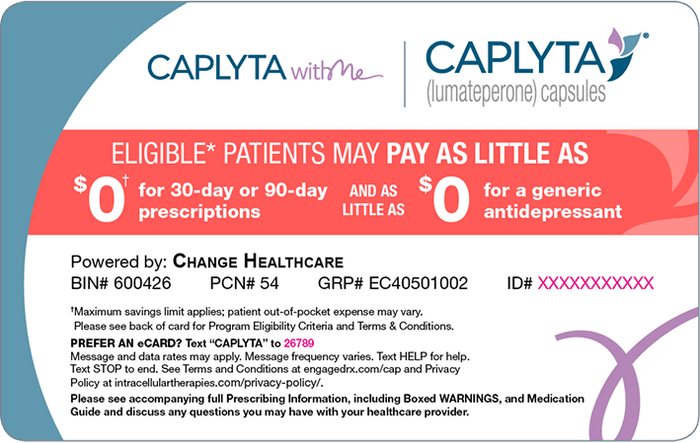Important Safety Information
BOXED WARNINGS:
- Elderly patients with dementia-related psychosis treated with antipsychotic drugs are at an increased risk of death. CAPLYTA is not approved for the treatment of patients with dementia-related psychosis.
- Antidepressants increased the risk of suicidal thoughts and behaviors in pediatric and young adult patients in short-term studies. Closely monitor all antidepressant-treated patients for clinical worsening, and for emergence of suicidal thoughts and behaviors. The safety and effectiveness of CAPLYTA have not been established in pediatric patients.
Contraindications: CAPLYTA is contraindicated in patients with a history of hypersensitivity to lumateperone or any components of CAPLYTA. Reactions have included pruritus, rash (e.g., allergic dermatitis, papular rash, and generalized rash), and urticaria.
Warnings & Precautions: Antipsychotic drugs have been reported to cause:
- Cerebrovascular Adverse Reactions in Elderly Patients with Dementia-Related Psychosis, including stroke and transient ischemic attack. See Boxed WARNING above.
- Neuroleptic Malignant Syndrome, which is a potentially fatal reaction. Signs and symptoms include hyperpyrexia, muscle rigidity, delirium, autonomic instability, elevated creatinine phosphokinase, myoglobinuria (and/or rhabdomyolysis), and acute renal failure. Manage with immediate discontinuation of CAPLYTA and provide intensive symptomatic treatment and monitoring.
- Tardive Dyskinesia (TD) may develop in patients treated with antipsychotic drugs, including CAPLYTA. TD can develop after a relatively brief treatment period, even at low doses, or after treatment discontinuation. The TD risk appears to be highest in elderly women. The likelihood that TD will become irreversible increases with the duration of the antipsychotic drug treatment and cumulative dose. If signs and symptoms of TD appear, consider discontinuing CAPLYTA if clinically appropriate.
- Metabolic Changes, including hyperglycemia, diabetes mellitus, dyslipidemia, and weight gain. Hyperglycemia, in some cases extreme and associated with ketoacidosis, hyperosmolar coma or death, has been reported in patients treated with antipsychotics. Measure weight and assess fasting plasma glucose and lipids when initiating CAPLYTA and monitor periodically during long-term treatment.
- Leukopenia, Neutropenia, and Agranulocytosis (including fatal cases). Perform complete blood counts in patients with pre-existing low white blood cell count (WBC) or history of leukopenia or neutropenia. Consider discontinuing CAPLYTA if clinically significant decline in WBC occurs in absence of other causative factors. Discontinue CAPLYTA in patients with clinically significant neutropenia or absolute neutrophil count <1000/mm3 and monitor closely until neutropenia resolves.
- Orthostatic Hypotension and Syncope. Monitor heart rate and blood pressure and warn patients with known cardiovascular or cerebrovascular disease. Orthostatic vital signs should be monitored in patients who are vulnerable to hypotension.
- Falls. CAPLYTA may cause somnolence, postural hypotension, and motor and/or sensory instability, which may lead to falls and, consequently, fractures and other injuries. Assess patients for fall risk when initiating treatment and periodically during long-term treatment.
- Seizures. Use CAPLYTA cautiously in patients with a history of seizures or with conditions that lower seizure threshold.
- Potential for Cognitive and Motor Impairment. Advise patients to use caution when operating machinery or motor vehicles until they know how CAPLYTA affects them.
- Body Temperature Dysregulation. Use CAPLYTA with caution in patients who may experience conditions that may increase core body temperature such as strenuous exercise, extreme heat, dehydration, or concomitant anticholinergics.
- Dysphagia. Use CAPLYTA with caution in patients at risk for aspiration.
Drug Interactions:
- Avoid concomitant use with CYP3A4 inducers.
- Reduce dose for concomitant use with strong CYP3A4 inhibitors (10.5 mg) or moderate CYP3A4 inhibitors (21 mg).
- Increased monitoring for serotonin reuptake inhibitor (SRI)‑associated adverse reactions is recommended when used with SRIs; including in geriatric patients who may be at greater risk for clinically significant hyponatremia.
Special Populations: Neonates exposed to antipsychotic drugs during the third trimester of pregnancy are at risk for extrapyramidal and/or withdrawal symptoms following delivery. Reduce dose for patients with moderate (Child-Pugh class B) or severe (Child-Pugh class C) hepatic impairment (21 mg).
Adverse Reactions: The most common adverse reactions in clinical trials (≥5% and greater than twice placebo) with CAPLYTA vs placebo were:
- Major Depressive Disorder (Adjunctive therapy): dizziness (17% vs 5%), dry mouth (13% vs 3%), somnolence/sedation (12% vs 2%), nausea (9% vs 4%), fatigue (8% vs 2%), and diarrhea (5% vs 1%).
- Bipolar Depression (Monotherapy, Adjunctive therapy): somnolence/sedation (13% vs 3%, 13% vs 3%), dizziness (8% vs 4%, 11% vs 2%), nausea (8% vs 3%, 9% vs 4%), and dry mouth (5% vs 1%, 5% vs 1%).
- Schizophrenia: somnolence/sedation (24% vs 10%) and dry mouth (6% vs 2%).
CAPLYTA is available in 42 mg, 21 mg, and 10.5 mg capsules.
Indications
CAPLYTA is indicated in adults for adjunctive therapy along with antidepressants for the treatment of major depressive disorder (MDD); the treatment of depressive episodes associated with bipolar I or II disorder (bipolar depression) as monotherapy and as adjunctive therapy with lithium or valproate; and the treatment of schizophrenia.
US‑CAP‑2500828
Please see full Prescribing Information, including Boxed WARNINGS for CAPLYTA.
 Prior Authorization Flashcard
Prior Authorization Flashcard







